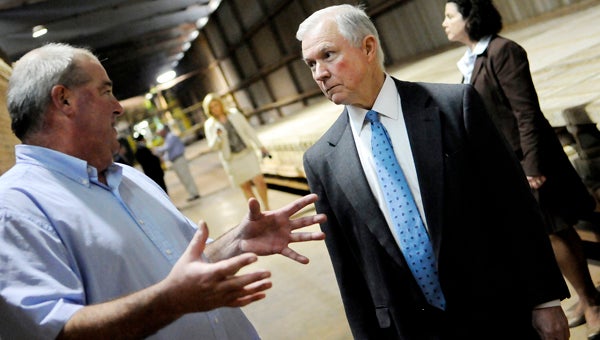Sessions voices opposition to proposed EPA regulations

Davis Henry talks to U.S. Sen. Jeff Sessions Tuesday during his tour of Henry Brick Company. After the tour Sessions said the EPA’s proposed Maximum Achievable Control Technology rule could adversely affect the brick industry.
U.S. Sen. Jeff Sessions (R-Ala.) is taking on the Environmental Protection Agency in his fight against regulations that would require the brick industry to capture 99 percent of emissions.
On Tuesday, Sessions toured Henry Brick Company to talk to employees and see first-hand how the industry could be affected. The stop in Dallas County is one of 67 for Sessions during his annual trip to every county in the state.
After looking at furnaces and brick-production lines, Sessions spoke briefly to Henry Brick employees, promising he would fight to protect the Alabama brick industry from unnecessary regulation.
“You guys have done great things environmentally, taking 94 percent (of emissions) out,” Sessions said. “Now the federal government, the EPA, is saying you have to have 99 percent out. That’s going to cost three times just to get another five percent out. This is way too expensive for too little benefit.”
The 99-percent, emission-capture requirement is part of a proposed Maximum Achievable Control Technology rule for brick and clay processes. It’s scheduled for proposal on Feb. 6, 2010 and finalization on Dec. 18, 2014.
A statement from the EPA said the regulations are necessary because no current rule exists to control emissions, but the proposed MACT rule would technically be the second introduced since 2000.
In 2003, the EPA issued a brick MACT that cost the industry $100 million, according to a news release. In 2007, a federal court struck down the MACT, meaning the regulations were no longer in effect, but Henry Brick and many other companies had already updated equipment.
To bring emissions to 99 percent, Henry Brick would have to spend nearly $8 million. Compounding future problems is the fact that Henry Brick hasn’t reopened its second production facility that was shuttered five years ago, shortly after the recession, meaning less generated revenue than the company is capable of.
After the tour, Henry Brick President Davis Henry said he is happy Sessions is fighting for the brick industry, but concerned the new MACT would cripple business.
“I think the scariest thing is the unknown,” Henry said. “We hope it doesn’t mean jobs, but when you are talking about a company our size borrowing up to $8 million to comply when our industry has been down for so long, you become dependent on the banks and are at the mercy of the banks.”
Sessions said one solution could be reintroducing the 2003 MACT, which most brick factories are already compliant with.
“We’ve got to maintain a brick industry in America,” he said. “There’s low economic growth in America and we’re not seeing much building and construction. That on top of these new requirements really endangers a plant

